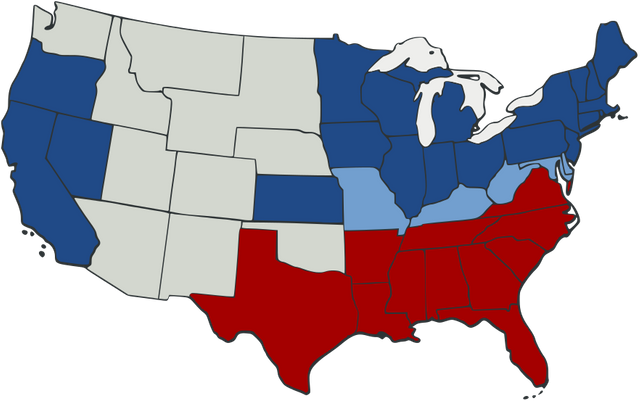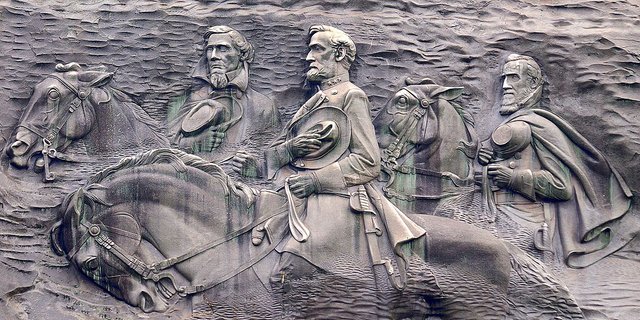Protests, Monuments, the Civil War, and Liberty
The protests, counter-protests, and clamor across the country are less remarkable for what they are about than what they overlook. After giving the matter quite a bit of thought, I think I can offer some insight that should broaden the discussion among those willing to approach the matter rationally. I ask readers to consider the arguments presented, and engage in a rational discussion when it comes to matters of history, current events, and monuments.
I suppose I need to clearly state up front that slavery is immoral and white supremacy is idiotic lest some trollish sophist try to misinterpret what I write. My record of support for individual liberty is universal, but this conflict has been so oversimplified in the public consciousness that it is difficult to address in a calm and clearheaded manner.
Anyway, carrying on:
The US Civil War and Slavery

Slavery was one factor out of many that precipitated the Civil War. A minority of white southerners owned slaves. They were the antebellum 1%-ers, so to speak. While these individuals held significant political power, it is absurd to imagine that their slavery stance could draw widespread support for secession. In fact, several slave states remained in the Union. Delaware, Kentucky, Maryland, Missouri, and what is now West Virginia did not secede.
Lincoln was not even an opponent of slavery in any active sense. He was a white supremacist who was only interested in abolition if it could guarantee a "white continent." In his fourth debate with Stephen A. Douglas, Lincoln said,
I will say then that I am not, nor ever have been, in favor of bringing about in any way the social and political equality of the white and black races, that I am not nor ever have been in favor of making voters or jurors of negroes, nor of qualifying them to hold office, nor to intermarry with white people; and I will say in addition to this that there is a physical difference between the white and black races which I believe will forever forbid the two races living together on terms of social and political equality. And inasmuch as they cannot so live, while they do remain together there must be the position of superior and inferior, and I as much as any other man am in favor of having the superior position assigned to the white race.
Further, in his first inaugural address, he clearly stated that he had no intention to abolish slavery, and fully intended to enforce the Fugitive Slave act while citing the Constitutional support for such action.
I have no purpose, directly or indirectly, to interfere with the institution of slavery in the States where it exists. I believe I have no lawful right to do so, and I have no inclination to do so.
Those who nominated and elected me did so with full knowledge that I had made this and many similar declarations and had never recanted them; and more than this, they placed in the platform for my acceptance, and as a law to themselves and to me, the clear and emphatic resolution which I now read:
"Resolved, That the maintenance inviolate of the rights of the States, and especially the right of each State to order and control its own domestic institutions according to its own judgment exclusively, is essential to that balance of power on which the perfection and endurance of our political fabric depend; and we denounce the lawless invasion by armed force of the soil of any State or Territory, no matter what pretext, as among the gravest of crimes."
In other words, Lincoln was not the heroic paragon of abolitionist virtue he has been made out to be. His threat to the South was more related to his industrialist crony connections and support for taxation of Southern agriculture.
That said, due to the Constitutional nature of these taxes, slavery was considered a "get out of the Union Free" card since Northern states were failing to enforce the fugitive slave act and Constitutional slavery provisions, so this disgusting excuse was chosen as proof that the North had already violated the Union, and thus released the South from any compact or contract to which it was beholden. Remember, slavery was also "Constitutional."
Other factors were at play, including confiscatory taxes that were disproportionately funneled to political cronies in the North. In fact, taxation is the reason Fort Sumter was not evacuated by the Union military despite previous agreements, and Lincoln's threats to use it as a tax enforcement station in a major Southern port was the reason it was fired upon.
The Complexity of Confederate Slavery Views
The military figures of the South are also much more complex individuals than is generally understood. Like many southerners in general, their views are more nuanced than is generally understood even if they are still repugnant to us today.
Stonewall Jackson, while a slave owner, appears to have been relatively neutral in his opinions. it was the status quo, and to his mind the natural course of affairs, and nothing more. In fact, he organized sunday school classes to educate both free and enslaved blacks in his community. While not a paragon of abolitionism by any stretch of the imagination, he was representative of a less-unenlightened class in the South.
Similarly, Robert E. Lee held a rather paternalistic view of slaves, believing that while slavery was an unsavory institution, it was beneficial for the slaves to be employed in Western civilization with its influences rather than left in their African homes. While less than exemplary, it is also less than the stereotypical malice as well.
All things considered, is it not fair to say that many Confederates held a relatively more enlightened view of African people than did Lincoln at the start of hostilities? Certainly, none are William Lloyd Garrison or Frederick Douglass, but it must be remembered that abolitionist views were in the minority among the political class across the US and Confederacy alike, and to claim that the Union sympathizers were saintly abolitionists is as gross an oversimplification as saying all Confederates condemned Africans as subhuman livestock.

The Monuments
Here we have an issue that must be considered on multiple fronts. The popular narrative about the Civil War has led to recent reactionary backlash against Confederate monuments as well. Consistent opposition to racism and oppression would require tearing down the Lincoln memorial along with these Confederate generals, after all. The attituide of those seeking destruction of statues strikes me less as tearing down Lenin and Stalin after the fall of the Soviet Union, and more like the vandalism committed against historical sites by ISIS and Al Qaida. It has the air of blind hate rather than repudiation of a totalitarian regime.
However, with that said, there is another side of this coin. Most of these monuments are "public property," meaning they are owned by various governmental entities. Governmental ownership is illegitimate, and thus by any rational sense, government property is unowned. Unowned property may legitimately be homesteaded by anyone. Destruction of government monuments, like graffiti on overpasses or other appropriation of "government property" violates no libertarian principles whatsoever from a natural rights perspective.
Likewise, anyone who supports the monuments needs to homestead and claim ownership of them, whether for mere historical preservation or white supremacist activism. This is the only morally responsible approach to the matter. Demanding that government tax dollars be used to maintain or destroy them misses the point. Organizations such as the Daughters of the Confederacy should take responsibility and reclaim ownership they negligently ceded to the State if they really care about their work.
Final thoughts:
-The good guy/bad guy narrative from either side prevents rational understanding of the moral failings on both side of the Civil War
If you're a white supremacist, stop cherry-picking data to support your prejudices. Confirmation bias is a dangerous thing.
If you're a fascist, remember that central planning invariably destroys economies and cultures. Check out my serialized posts of The Law by Frédéric Bastiat to understand the inherent flaws of political hubris.

Image 1 credit
Image 2 credit
Image 3 credit

If you like this post, please comment, follow, and resteem!

If you like this post, please comment, follow, and resteem!
@jacobtothe,
This is not a post! This is a d*mn great post of US history, politics and etc! Wow that's amazing work my dear friend! Really appreciate your work and effort!
(My voting power is still regenerating, therefore please allow me three more days to provide 100% upvotes for your posts)
Cheers~
Great post/history lesson.
@jacobtothe - Sire, I like this great historical article. You have a good sense about them Sire. Therefore, I will RESTEEM & UPVOTE your post Sire.
+W+